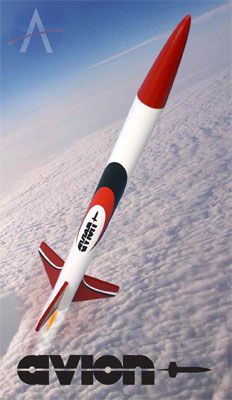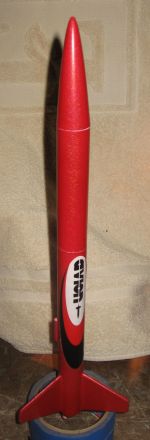| Construction Rating: | starstarstarstarstar_border |
| Flight Rating: | starstarstarstarstar_border |
| Overall Rating: | starstarstarstarstar_border |
| Manufacturer: | Apogee Components  |

Brief:
A skill level I rocket kit made with components of higher quality than is typically seen in similar kits by other
companies. It teaches techniques that aren't seen in other skill level I rockets. The Apogee website has a newsletter
archive that includes an article about building a payload into this rocket. This (among some others) was a modification
I did complete.
Construction:
I didn't realize that the Avion wasn't in the database until I wanted to file a flight log, so I wasn't expecting to
do a review. As a result, I do not have pictures of the individual components, just the finished rocket.
Trust me when I say this is a quality rocket. After a 30-year hiatus, I'm a "Born Again Rocketeer". This was the fifth rocket I constructed in about a month, so I feel I can justify the statement regarding quality.
The kit was shipped in a well-packaged box. The rocket itself is in the standard plastic bag with the flashy picture on the front. All items in the kit were in fine shape and accounted for.
As I was laying out the components, I did notice the body tube seemed higher quality than other rockets I had built. The fins were narrow/thin, but not particularly flexible (a problem I've had with other kits). The shock cord assembly was noteworthy in that it wasn't a string of elastic that was glued to the sidewall of the body tube. Instead, it is a piece of Kevlar® string that is fastened to the engine mount. Also noteworthy were the spirals: they seemed shallower than other rockets.

This was a pretty easy rocket to assemble. I tend to be meticulous, so the extra time spent was my fault. I'd guess most people would assemble this in the course of an evening. As mentioned above, I did some modifications, which added significant time.
As for the instructions, there was a minor "gotcha" or two I had to re-read, though I don't recall what it was. The pages begin with a nice introduction clearly geared towards people building their first rocket. It is suggested, as with anything requiring assembly, to review the instructions ahead of time.
The shock cord assembly is a technique that is unique to a beginner's rocket kit in that it's not glued (Estes-style) to the sidewall of the body tube. Instead, it is attached to the engine tube/mount and then passed through the forward centering ring. This was the first time I did this technique, and I had a little difficulty when I attached the engine assembly to the body tube: I first smeared the glue in the body tube, then dropped the shock cord in (as the instructions stated), then slid the assembly into the body tube. Glue got on the shock cord and made it stick to the side of the body tube. I don't know if this is a big deal or not, but I did wonder if it would detract from the full function/performance of the cord. I also thought I read somewhere that glue on the Kevlar® shock cord isn't a good thing, but don't know if this is true. I did pull it from the side of the tube because I thought it might dent the body tube if ejection was forceful enough.
I like tapering the fins, so I had taken the time to round the leading edges and taper the trailing edges. I don't recall if this was listed in the instructions. Another modification involved gluing "skins" on the fins as opposed to sealing them as instructed. I like the skins because I find them easier and maybe faster than sealing. The one time I tried sealing fins resulted in warped fins (too much liquid). Another mod I did was the payload bay.
Apogee's website has a long archive of previous newsletters that include everything from glue reviews (worth looking at, by the way) to the physics behind why things work. It has instructions on making a payload bay in a single stage rocket. The payload bay was surprisingly easy modification but time consuming. I cut the body tube a little less than 4" from the top. I glued in the coupler, which also were ordered from Apogee. The bulkhead was constructed out of cardboard-type centering ring paper. It's easy to cut but took a while to sand down to a nice fit. I smeared glue all over the bulkhead to make it stronger and was sure to made a fillet on either side of it when I attached it to the coupler.
This mod resulted in a necessary mod for attaching the chute. Instead of attaching it to the nosecone, I attached it directly to the shock cord between the aft section and the payload bay. The shock cord was then passed through a small hole in the bulkhead and tied to the nosecone. I did all this after painting, as described below.
The rest of the construction was fairly straightforward. The directions show how to make straight lines for the fins (another technique not all other companies show). This rocket included my first experience with liquid 10-minute epoxy, I had previously used 5-minute clay epoxy. I like the liquid stuff better because I found it easier to smooth and feather. I put on 2 glue fillets then 1 epoxy fillet that extended 1/2-3/4 inch up the fin and onto the body tube.
I'm not a fan of rockets that won't stand on their own. The engine mount in the Avion prevents the rocket from standing. I do wish the picture on the Apogee website would have depicted this more clearly.
Finishing:
Finishing was pretty straightforward. The nosecone required sanding to scuff it. I then did 2 coats of Krylon primer
and wet sanded with 220 grit after it cured for 2 days.
I made this kit with my 5 year old son, and it was our fifth rocket. So far, we followed the paint recommendations once. Instead of white with blue and red, we painted Avion all red then sprayed on a coating we got from an automotive parts store that made it look "sparkely".
I didn't fill in any of the spirals during construction. If you're more than a few feet away, they pretty much disappear. I used 3 layers of primer and 3 layers of paint.
I didn't put on the decals but still may. It's not that they look cheesy or overly flashy, but I feel they're too big (see picture). Also, some of the decals had lost their stickiness and were peeling from the backing of the decal sheet. Since everything else about this kit felt sturdy and had quality, I'd expect the decals to not curl/warp and to remain on the sheet until I remove them.
This rocket looks really good on the pad no matter what color it's painted.
The only reason this is a 4.5 and not a 5, is that a 5 implies perfection. The issue with the decals, the thin fins, the little "gotcha" that I don't recall, and the rocket not standing on its own (not depicted in the website photo or description) is what made this a 4.5 instead of a 5.
Construction Rating: 4 out of 5
Flight:
Because the rocket doesn't stand on its fins, flight preparation was a hair trickier than other rockets because it
needed something to hold it up. When I launched rockets as a kid, I remember wrapping tape around the launch rod. I
didn't want to do this because it can be a pain to take it off. So I used a little stone... No big deal.
I used a B6-6 for the first flight even though the delay is longer than recommended by Apogee. It was a still evening so I didn't want to start with an A as I often do (I wanted to see some altitude). I also knew drift would be minimal, I hoped. Plus, I'm too cheap to go buy more engines if it isn't necessary, so I tried the B6-6 because I had them on hand. Last, the field was small so the extra delay was helpful. And I wasn't certain of the winds at altitude.
The Avion took off just as fast as any other rocket I've built this month. However, it went surprisingly high. I don't have an altimeter yet, so don't know how high, but several people were certain it went over 1000' on the B engine. Apogee's website predicted 730, but that's without airfoils, skins, etc., which will improve the performance of the rocket.
The extra 2 seconds for the ejection seemed to drag on forever, I started yelling to the rocket "C'mon, pop! C'mon, pop!", and then she popped just as she did a perfect arc (only visible due to the smoke trail). The ejection seemed to happen just as the nosecone began to point down. So the B6-6 was a fine substitute.
Recovery:
Recovery went smoothly. The chute was easy to pack, and the diameter of the body tube was easy to work with. I used 3
sheets of wadding because I've been having difficulties with my recovery items singeing from the heat of the ejection
charge.
I expected a high flight so had cut a spill hole in the center of the chute. The rocket seemed to hover more than it should, and I recall something from High School physics that made me wonder if the spill hole wasn't big enough and therefore contributed to the "hovering". I'll make the hole bigger or cut some slits into the chute. I may even read up on some physics to learn why the descent seemed slower than expected.
Because of the altitude, the rocket drifted a little bit even though the wind was very light. There was no singeing and no other damage to the rocket. There were no marks on the tips of the fins from the engine.
Flight Rating: 4 out of 5
Summary:
This was a great rocket to build. It was nice to build something with a slightly larger diameter than the Starlight I
built previously and with higher quality parts than some others kits I recently built.
I liked the assembly of the shock cord as well. This is something I'll try to do on future rockets.
Overall Rating: 4 out of 5
Other Reviews
- Apogee Components Avion By Chan Stevens (September 20, 2008)
Brief: Apogee recently introduced this potential build/fly candidate as a basic Alpha class model. 3FNC design, 18mm motors, and fairly nice-looking. It also flies well and can potentially be a soccer field flyer on A motors. Construction: Apogee's part quality is usually excellent, though in the past I've had some issues with the die-cut fins which tend to have crumpled ...
 |
 |
Flights
Sponsored Ads
 |
 |











